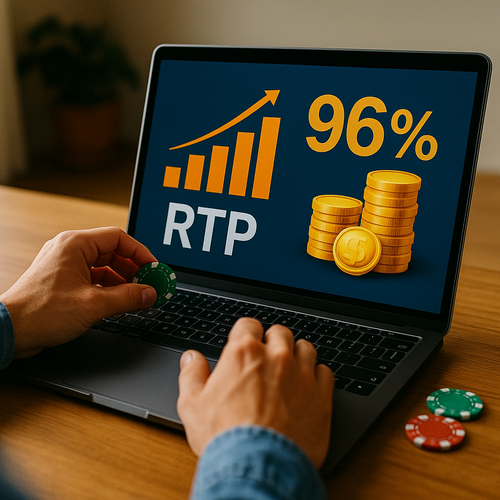What is RTP and why understand it
Review release date: April 29, 2025

RTP is one of the main metrics that every player must look at before placing a bet. But what does it really mean, how to interpret it correctly, and why should you not expect an instant result?
Let's figure it out in detail:- What RTP is and how it is calculated
- How does it affect the chance of winning
- Where to watch RTP
- Why RTP ≠ Guaranteed Returns
- How does it differ from volatility and variance
What RTP means
RTP (Return to Player) is a "return to player." It shows what percentage of bets a slot or game theoretically returns to players in the form of long-distance wins.
If the RTP slot has 96%, this means that on average for every 100 € of bets, the slot will return 96 € in winnings. The remaining 4 € is casino margin.
How is RTP considered?
RTP is a mathematically calculated metric based on millions of spin simulations. Its formula is:RTP = (Total Winnings/Total Bets) × 100%Important: RTP does not take into account specific players, but refers to the entire mass of bets made by all users over a long period.
RTP Range - Poor to Excellent
A value of 96% or higher is considered good RTP.
Why is RTP not a guarantee of winning?
Many players mistakenly think RTP works as a throwback in a particular session. In fact:- RTP won't say exactly when wins will happen
- RTP works at a distance of thousands, or even millions of spins
- RTP doesn't mean you'll necessarily get 96% back
- You play 100 spins of 1 €. With RTP of 96%, this does not mean that you will definitely get €96 back. Maybe 20 €, or maybe 300 €. It all depends on volatility.
How RTP relates to volatility
Examples:- High RTP + high volatility - rare but big wins
- High RTP + low volatility - frequent but small wins
- Low RTP - either way, the game is potentially less profitable
Where to look for RTP?
Ways to find the RTP of a specific game:1. On the official website of the provider (for example, Pragmatic Play, NetEnt, Play'n GO)
2. In the information section of the slot (icon "i" or "?" In the game interface)
3. On specialized portals and aggregators (SlotCatalog, AskGamblers, etc.)
4. In reviews from casinos or gaming bloggers
Important: some casinos may run the same game with different RTPs (e.g. 94% or 96%). Check the version!
How to use RTP in practice
1. Compare games before bet
Choose slots with RTP at least 96%, especially if you are playing for real money.
2. Factor in volatility
If RTP is high, but you suffer long losses - perhaps a slot with high volatility. That's fine, you just need more bankroll and patience.
3. Use wager bonuses wisely
To win bonuses, choose slots with high RTP and average volatility - to make more revolutions and get closer to winning faster.
FAQ
RTP is the same in demos and for real money?
Not always. Some providers use fixed RTP in the demo, but before the final game it is better to check RTP with a specific casino.
Can casinos reduce RTP?
Yes, if the provider offers multiple versions of the same slot. The casino can choose which version to deliver - with RTP 96%, 94%, and sometimes even 92%.
Are there any slots with RTP above 98%?
Very rare. Examples: Ugga Bugga (99. 07%), Mega Joker (up to 99%) - but they can have special conditions or low volatility.
Conclusion
RTP is an important tool in the player's arsenal to understand how profitable long-distance play is. But this is not a magic guarantee of return.
To play effectively:- Compare RTP between slots
- Consider both volatility and game structure
- Always check RTP terms at a specific casino
- Do not forget that entertainment is more important than mathematics
See also: "How to read the rating," "What is slot volatility," "The most generous machines."